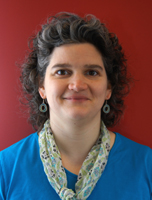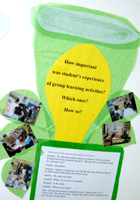Transcription of video segments after reading character poems:
Jennifer: So, did these poems change or reinforce what you already thought about this character (Simon)? Did they give you different ideas or a stronger idea?
Sandre: (inaudible)
Jennifer: Sandre is saying here you all talk about him being strong and he didn't really think about him being strong.
Janelle: Oh, yeah. Me either.
Jennifer: Where do you see his strength?
Douglas: In his mind.
Jennifer: What do you mean?
Jean: He uses his brains to (inaudible) force. Other people rely on visual stuff. He uses his mind. It helps him think what he should do and how he got to help others.
. . .
Jennifer: Here's my last question for you. After hearing these poems, what do you think - as a class - what do you think about our understandings of these characters? How do you feel about our understanding?
Sandre: Some characters got stronger. Simon, I think he got stronger in my opinion cause I didn't think of him as strong. You know, Ralph and Piggy, I always thought of them the same way.
Jennifer: That's really interesting, because it ties in to the reflection question about understanding how authors tell stories through changes in characters. Do you feel like you have a good, strong understanding of the characters?
Various students: Yeah. Yeah. Yeah. Yeah. Yeah.
Jennifer: What's your evidence of that?
Inae: Because we were all in different groups, like we all had our character and if everybody had all these characters, we wouldn't be able to understand as much because each group focused on one thing so they could find more evidence.
Jennifer: Do you think that having experts on each character helped everybody know the characters better?
Various students: Yeah. Yeah.
Jennifer: How? Can you explain how to me? Who else said yeah? OK, you and then you.
Janelle: Because everybody... it's kind of like what Inae said. If everybody was focused on one character you would probably, like everybody has their own perspective and understands things differently so, like, you would understand that character more but you like split it up into groups, like everybody had their different understandings and stated their opinion.
Jennifer: Oh, so you mean your Ralph group helped you understand Ralph better?
Janelle: Yeah, but by making that poem and by us discussing with the class it helped us look at things differently and understand things more.
Jennifer: OK, so you're saying that you wouldn't understand your character as well if you didn't have your group, and the whole class wouldn't understand your character as well if you didn't know it so well and be able to share it. Douglas, what were you going to say?
Douglas: I was going to say it worked because, like, he (gesturing to Sandre) didn't think that Simon was strong at all.
Janelle: Yeah, that's what I was going to say.
Douglas: 'Cause he thought that I meant by strong probably physically, but (inaudible), I said, no, I was talking about the mind.
Jennifer: So if you weren't focused on Simon, do you think you would have picked that up about him?
Douglas: No.
Jennifer: OK, but because you were focused you picked it up and you could share it with other people.
Janelle: Yeah, its like when you have one thing to focus on, it's easier to learn it and then have it like to focus on the whole group learning it.



